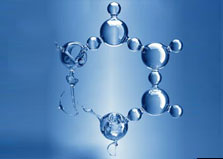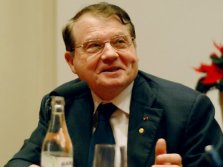
UNESCO to host meeting on controversial 'memory of water' research.
The United Nations Educational, Scientific and Cultural Organization (UNESCO) is potentially wading into hot water next month when it hosts a meeting set up by Nobelist Luc Montagnier to discuss his controversial research on what has become known as "the memory of water." The afternoon at the agency's Paris headquarters will feature talks about the virologist’s widely ridiculed idea that water can carry information via an electromagnetic imprint from DNA and other molecules.
The meeting has so far raised little public opposition from researchers, but the announcement on UNESCO's website acknowledges its controversial nature, saying:
The promoters of this conference are aware of the critical reactions aroused by this work in parts of the scientific community, so they wish to communicate their results with the utmost rigor. The aim is to foster a broad and multidisciplinary discussion. These data seem particularly important because they further enrich the immense achievements of molecular biology. They also suggest the development of new modes of transmission of genetic messages (transmission, transduction, teleportation, etc.).
Montagnier says the issue is actually getting less controversial as fresh evidence for his claims is coming in. "More scientists are becoming convinced by the data," he says.
At least one blogger is taking offense, however: "Shame on @UNESCO for hosting this absurd pseudoscience conference about Montagnier's nonsense," tweeted Andy Lewis, who hosts the blog The Quackometer, last week. "This is classic pathological science—dredging around in the noise of irreproducible experiments by practitioners whose expertise is not in these fields in order to support hypotheses that fly in the face of well-established scientific principles," Lewis writes in an e-mail to ScienceInsider.
Montagnier, 82, who shared the Nobel Prize in physiology or medicine in 2008 for the discovery of HIV, stunned many fellow scientists about 5 years ago with claims that DNA emits weak electromagnetic waves that cause structural changes in water that persist even in extremely high dilutions. Montagnier considers himself an intellectual heir to the controversial French scientist Jacques Benveniste, who claimed in a 1988 Nature paper that water can retain "memories" of compounds even when diluted at a very high level—a claim that caused a sensation in the press and was taken as support of homeopathy by its proponents, but that other scientists weren't able to replicate.
Montagnier says he and his colleagues have a device that can detect such waves, which are strongest when they come from bacterial and viral genetic material. "In the future, we may use these findings not just for diagnostics but also for treatment," Montagnier told Science in 2010. "It's possible that electromagnetic waves at some frequency will kill the waves produced by bacterial DNA."
Montagnier documented the claims in a few papers in 2009. But many scientists have been extremely skeptical. Swiss immunologist Alain de Weck, who had long known and respected Montagnier, said he was "perplexed" in 2009. Lewis and other skeptics skewered his papers. Montagnier has also come under heavy fire for promoting long-term antibiotic treatments for children with autism; he claims his detection technique has shown that microbes play a role in that disorder.
At the meeting, Montagnier says he will present new, unpublished results showing that living cells can pick up patterns of electromagnetic waves—even when they're sent over the Internet to another lab—and synthesize the DNA encoded in them.
John Crowley, head of UNESCO's Research, Policy and Foresight Section, says the agency doesn't endorse or oppose Montagnier’s theories; it's a "normal procedure" for the organization to host the meeting, Crowley says, because the World Foundation for AIDS Research and Prevention, which Montagnier chairs, has an official association with UNESCO, and the foundation's office is at the agency's Parisian headquarters. "We're just fulfilling one of UNESCO's roles, which is to offer an intellectual space for ideas to be discussed," Crowley says. "No more, no less."
Lewis says that UNESCO's participation may confer legitimacy on homeopathy, "with the result that people may end up harmed or killed" because they turn to homeopathy instead of proven therapies. But Montagnier says homeopathy is not on the agenda of the meeting, although he can't prevent the audience from asking questions about it.
The meeting features presentations by three other scientists. Among them is Carlo Ventura of the University of Bologna in Italy, whose presentation is titled "The voice of the stem cells: mutant vibrations and regenerative medicine." Mathematician and Fields Medal winner Cédric Villani, who heads the Institut Henri Poincaré in Paris, will offer a summary of the talks and place them in the context of the Benveniste controversy. UNESCO Director-General Irina Bokova was originally scheduled to make the opening remarks but canceled her participation last week because of an agenda conflict, says Crowley, who will replace her.

